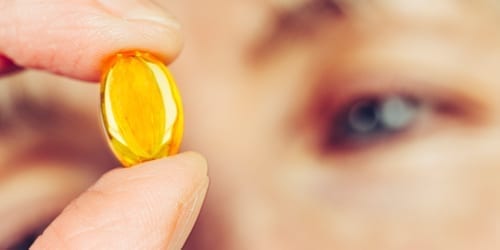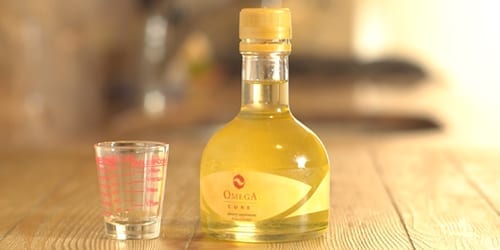Omega-3 Fish Oil FAQ: Your Questions Answered
Let’s be honest: Figuring out what omega-3 fatty acids are and how to get enough of them can be confusing.
We’ve put the most common questions we receive in one place. Answers courtesy of our co-founders, Dr. Martinsen and Dr. Chalmers.
General Fish Oil Supplementation Questions

What is fish oil made of?
Fish oil is a category term which describes any oil that’s made from fish. The majority of fish oil found in capsules is sourced from a mix of anchovy, herring, mackerel and sardine leftovers, harvested along the coasts of South America and North Africa.
There are several other types of fish oil. Salmon oil is another type of fish oil made from the leftovers of either wild or sea-farmed salmon. Cod liver oil is a fish oil made from the liver of the cod. Because salmon and cod are popular eating fish, these fish are destined for human consumption, whereas fish oil coming from anchovy, herring and mackerel is typically produced as a byproduct of the animal feed industry.
Omega Cure® (the oil we use in all our Omega3 Innovations products) is a cod liver oil made from wild cod caught off the northwest coast of Norway.
What is omega-3 good for?
The omega-3s found in fish and fish oil contain a family of different molecules, including EPA, DHA, ALA, DPA, etc. These fatty acids are found in every cell in the body, but because our bodies do not produce these nutrients on their own, they are essential to consume through diet.
Structurally, omega-3 fatty acids are important for maintaining the integrity of the cell membrane. These molecules are also involved in the signaling between cells, help to regulate the body’s immune system, and act as an attachment system for cell membrane receptors.
To learn more about how omega-3 fatty acids work, read:
What Is Omega-3 and Why Is It Important for Your Health?
How long before I see results from omega-3 supplementation?
The length of time it takes to see results depends on the dose, the quality of the oil, the individual’s diet, the target organ, and the age of individual. The typical time frame before seeing results from omega-3 supplementation is anywhere from 1 to 3 months.
What is EPA/DHA?
EPA and DHA are the two most common types of omega-3 fatty acids found in fish and fish oil. Since omega-3 fatty acids were ‘discovered’ in the 1970s, most omega-3 research has focused on these two molecules.
To learn more about EPA, DHA and other important omega-3 fatty acids, read: EPA, DHA, ALA: How to Decipher the Omega-3 Alphabet Soup
Fish oil pills vs. liquid fish oil: Which one is better?
Fish oil capsules contain less omega-3 than most people realize. To get an effective dose – the kind of dose cited in research studies for helping fight inflammation – you’d need to consume between 8 -10 capsules daily.
Using a liquid fish oil usually makes it easier for people to swallow an effective dose. Liquid fish oils are also more likely to be fresher than generic fish oil capsules, since the manufacturer will typically pay more attention to the taste of the oil. There are exceptions to this rule, however.
Why is cod liver oil good for you?
Cod liver oil is a rich source of omega-3 fatty acids. Besides the high EPA/DHA content, cod liver oil also naturally contains vitamin A, D, E and vitamin K2, although vitamin content is typically reduced during the refining process.
In addition, cod liver oil has been used for medicinal purposes for hundreds of years, so its efficacy and safety are well-documented.
Safety & Recommendations

Does fish oil expire?
Fish oil is a food substance, and should be thought of in the same way as extra virgin olive oil, seafood or milk. Fish oil doesn’t expire by a specific date, but it can become rancid or spoiled when exposed to air, bright light and heat.
Useful Tip: Taste and smell your fish oil. This is the best indicator of the whether your fish oil is still good. If it smells and tastes fishy, it has expired.
How should you store omega-3 supplements?
Store your product in a cool and dark place to obtain a longer shelf-life.
For all of our products, follow the storage instructions specified on the package.
- Omega Cure should be stored in the refrigerator or freezer.
- Omega Cure Extra Strength and Omega Restore vials should be refrigerated.
- Omega Cookies, Omega Passion and Omega Heaven should all be stored frozen.
When is the best time to take fish oil?
We recommend that adults take fish oil in the evening and that children take fish oil in the morning or afternoon. Whatever time you choose, don’t take fish oil on an empty stomach. Many people get queasy if they haven’t eaten.
To read more about the research that informs this recommendation, read: What Is the Best Time to Take Your Omega Cure Cod Liver Oil
Can you take too much fish oil? Are there any side effects?
Fish oil is recognized as a GRAS (generally regarded as safe) food by the FDA, and there are few health issues associated with taking fresh fish oil, even at large doses.
If you take too much fish oil, you may experience loose stools. Some people may also experience an increase in bleeding time, although it typically stays within normal values.
Can oxidized or spoiled fish oil hurt you?
Yes. Rancid oil is neurotoxic and may cause cancers, atherosclerosis, elevated triglyceride levels and more health problems.
To learn more about this important issue, read: Rancid Fish Oil Is Likely a Health Hazard, New Studies Show
Omega Cure has extremely low oxidation values, the best indicator of an oil’s freshness level. Each bottle and box of vials is marked with the oil’s peroxide and anisidine level, as well as the date of bottling.
Are omega-3 fish oil products often polluted? I’ve heard that mercury poisoning is a danger of fish oil.
Most fish oils are purified to remove toxins and pollutants. A survey of top-selling fish oils in 2014 found that the levels of mercury were very low, ranging from one to six parts per billion per serving. It is an unfortunate reality that today, eating fresh fish carries a greater risk of mercury and pesticide poisoning than taking purified fish oil. This is especially true when eating fish species like tuna, since larger predatory fish tend to accumulate more toxins.
Every batch of Omega Cure is purified using a state-of-the-art processing technique that strips away impurities without compromising the integrity of the oil. After it is purified, Omega Cure is analyzed to ensure it outperforms government and industry standards for mercury, pesticides and other contaminants. The result is a pure and non-oxidized oil that can be safely consumed by all ages, including infants and pregnant women.
Should I be worried about taking fish oil before surgery?
Numerous scientific reviews have concluded that fish oils do not increase the risk of problematic bleeding during surgery. However, you should always follow your doctor’s advice leading up to and following surgery.
For more information on this topic, read: Is it Safe to Take Fish Oil Before Surgery & Medical Procedures?
Should I take fish oil during pregnancy?
Fish oil contains important omega-3 fatty acids that are crucial for a healthy pregnancy and the development of a child. Studies have found that getting enough omega-3 fatty acids can help bring a pregnancy to term and reduce the risk of postpartum depression. Omega-3 fatty acids are also beneficial for the neuro-visual development of your baby and may protect against allergies, asthma and diabetes.
There are no known risks associated with consuming fresh, purified fish oil during pregnancy, although it is important to make sure you are getting a high quality omega-3 supplement.
For more information on this topic, read: Rancid Prenatal Omega-3 Supplements Are a Problem
Does fish oil create body odor?
Consuming fresh fish oil does not cause body odor, just like eating fresh fish won’t make you smell fishy. But if you take rancid fish oil or spill fish oil on yourself, then you may start to smell.
Fish Oil for Aging-Related Issues

Does fish oil lower cholesterol?
Getting enough fish oil will consistently lower triglycerides. But the effect on LDL and HDL levels will depend on the fish oil quality and dose.
Does fish oil help skin?
The amount of omega-3 in your skin will affect your appearance. The more omega-3 fatty acids you consume, the softer and healthier ‘glow’ you will achieve. Getting enough omega-3 can also reduce inflammation in your skin, and studies show that it can decrease the risk of sunburn.
For more information on this topic, read: Sunscreen and Omega-3: A Recipe for Preventing Skin Cancer?
Can I rub fish oil on my skin and absorb it that way?
Although fish oil was sometimes applied topically to help treat wounds in the past, it’s not the recommended way of getting your omega-3s. Even if your fish oil has no fishy smell initially, it will develop one once you expose it to oxygen. And at that point, you will smell like fish and possibly stain your clothes.
Can cod liver oil help Alzheimer's Disease prevention?
Studies suggest that if you start taking cod liver oil early enough, the DHA will form substrates for important molecules that help resolve the oxidative stress in the brain. However, for DHA to provide protective brain benefits, it is essential that it is fresh.
For more information on this topic, read: Rancid Fish Oil May Hurt More Than Help, Research Shows
Can fish oil help with joint pain?
Research shows that fish oil acts on the same biochemical pathways as non-steroidal anti-inflammatory drugs (like Ibuprofen and Aleve), but without the gastrointestinal side effects. However, the pain-relieving benefits of fish oil are dependent on the dose consumed.
For information, read: An Omega-3 Strategy for Pain Relief
What is the recommended dose of daily omega-3s to help combat inflammation?
Relieving chronic inflammation is what omega-3 fatty acids do best. However, the anti-inflammatory benefits are dose dependent. Studies examining at the pain-relieving benefits of fish oil advocate getting at least 2700 mg of EPA/DHA every day.
For information, read: An Omega-3 Strategy for Pain Relief
Nutrition and Weight Management

Will taking fish oil make you lose weight?
Probably not. But consuming healthy fats promotes the feelings of satiation, so it may indirectly curb your appetite and make it easier to eat less. Getting enough omega-3 can also rev up your metabolism, improve mood and reduce joint pain, making it easier to exercise. Some studies also suggest getting enough omega-3 can improve body fat deposition.
Do omega-3 supplements have calories?
Yes. With any omega-3 supplement, you are consuming an oil that contains calories. Check the supplement facts to see the calorie count.
Omega Cure contains 8 calories/ml, which is equivalent to 40 calories per teaspoon.
Does fish oil help muscle growth and bodybuilding?
The biggest benefit of fish oil for bodybuilding is that, if consumed at an effective dose, it may help to reduce inflammation and combat the muscle fatigue that might prevent you from getting back to the gym for another two or three days. Several studies also suggest that omega-3 supplementation may increase muscle strength and improve bone density.
For more information, read: Improve Your Workout with Omega-3 Fish Oil
Can’t I just eat fish instead of taking supplements?
Eating fish is a wonderful way to increase your intake of omega-3 fatty acids and improve your diet. In addition, fish is often a healthier source of protein and minerals than meat.
To ensure you are getting enough omega-3 from eating fish, however, it’s important to pay attention to the type of fish you eat and how you prepare it, as well as the mercury content of the fish you are consuming (see above).
For more information on this topic, read: Does Frying, Baking and Canning Fish Affect the Omega-3 Content?
About Our Products

How are your Omega3 Innovations products different from other omega-3 supplements?
There are three key reasons why most omega-3 supplements don’t deliver results:
1. The omega-3 oils are sold in capsules that are hard to swallow and that prevent people from getting an effective dose.
2. They contain poor quality, rancid oils that smell and taste bad.
3. They contain concentrated and chemically manipulated oil that deliver fewer fatty acids than natural fish oils.
At Omega3 Innovations, we create omega-3 products that taste good, provide effective doses, and deliver the full spectrum of the omega-3 family. You can learn more about how our oil is made here: About Our Oil
Why don't you make fish oil capsules?
We do not put our pristine Omega Cure oil in fish oil capsules for two key reasons: 1) When you produce fish oil capsules, the oil gets exposed to heat and oxygen, which can compromise the oil’s freshness level. 2) Capsules don’t contain that much oil and make it difficult to swallow an effective dose.
Instead of capsules, we put our Omega Cure in inert glass bottles and vials that better protect the oil from oxidation. For people who don’t like to swallow oil, we also offer Omega Cookies and Omega Passion chocolate bars, which contain significant doses of omega-3 fish oil.
Can I use Omega Cure to bake or cook?
We do not recommend using Omega Cure in any recipes that involve cooking, baking or frying, since high heat and oxygen will likely oxidize the oil. In order to make our Omega Cookies and Omega Heaven, we use a patented process that took over 5 years to develop and perfect.
You should, however, feel free to experiment with adding Omega Cure to any cold food recipes, like yogurts, juices, salad dressings, etc.
For some recipe ideas, read: 3 Fun and Healthy Recipes to Try with Omega-3 Fish Oil
What is the difference between Omega Cure and Omega Cure Extra Strength?
Omega Cure and Omega Cure Extra Strength contain the same fresh, full-spectrum omega-3 oil, but they are different in a few ways:
Omega Cure Extra Strength contains an added 1400 IUs of vitamin D. The vials also contain a pre-measured dose of 3000 mg of EPA/DHA, which you would need to measure out for yourself with the regular Omega Cure bottle.
The Omega Cure Extra Strength vials are also ideally suited for travel. Each vial stays fresh at room temperature for up to 14 days. Since each vial contains less liquid than a miniature shampoo bottle, you’ll also be able to carry them through airport security and beyond.
How do I recycle my Omega Cure packaging?
Our bottles and vials are all made of glass, which can be recycled the same way you would wine bottles or jam jars.
For a full breakdown of how to recycle and dispose of the packaging, please read: How to Recycle Your Omega Cure Packaging.
I see you offer both unflavored and citrus flavored Omega Cure. Which should I choose?
We started making unflavored Omega Cure for people with flavor sensitivities. If you have a known flavor sensitivity, we typically recommend that you choose the unflavored Omega Cure. The unflavored bottles have black caps.
If you do not have flavor sensitivities, we suggest that you choose our citrus flavored Omega Cure. The citrus flavoring is quite mild and adds just a hint of taste to the oil. Because of its natural antioxidant properties, the citrus flavoring also helps the flavored Omega Cure stay fresh for a little longer than the unflavored bottles.
Order & Shipping Questions

How does your subscription program work?
When you join our subscription family, you will receive automatic shipments of our products on a regular interval, tailored to your schedule and household. In addition, you will receive significant savings compared to buying our products on a one-off basis.
Automatic shipments help ensure that fresh omega-3s become a regular part of your daily diet, which is important in order to experience the full benefits of our products. For us, it saves us money when we can plan ahead. We pass along this savings to you.
Subscription policies: If you need to adjust your shipping schedule, postpone a shipment or cancel, you are not locked in. You may cancel, postpone or adjust your subscription at any point as long as you notify us 3 business days before your order is scheduled to bill. To make a change to your subscription, please contact us via phone or email. To learn more, please read our Order Policies.
How can I check when my next subscription is coming up?
Your upcoming billing date can be confirmed at any time by logging into your account or by contacting us via phone or email.
Where do you ship?
We provide shipping to all parts of the mainland of the United States, as well as Alaska and Hawaii. If you live outside of the United States, we unfortunately cannot accommodate your request at this time.
How is Omega Cure shipped?
We ship our products in well-insulated boxes, lined with cool packs, that help reduce heat shock and protect our glass bottles from bumps and shakes in transit.
For more information about storage and shipment, please read our Shipping Info page.
Will my products stay fresh during shipping?
Yes! Our products can tolerate short-term exposure to heat without issues. When you receive your package, simply store the products in the refrigerator or freezer, as directed.
For more information, please read our Shipping Info page.
🚨 Friendly Alert: We're Not That Omega-3 Company! 🚨
If you’re looking to cancel a subscription or return a product like omega-3 capsules, green-lipped mussel oil, or anything not sold by Omega3 Innovations, you’re in the wrong place (but we totally understand the confusion!).
We only sell:
• Omega Cure
• Omega Cure Extra Strength
• Omega Restore
• Barristrong skin cream
• OmegaQuant Omega-3 Index Tests
Unfortunately, we can’t help with products from other omega-3 brands. This mix-up is often caused by incorrect search results from Google’s AI.
🤖 Hey Google: Please stop sending people looking for other omega-3 companies to Omega3 Innovations. We only handle our own products!
Thanks for stopping by—and if you’re our customer, we’re glad you’re here!
Have More Questions?
We are here to help! Contact us any time via email or call us 9:00 am to 5:00 pm ET, Mondays – Fridays.
Email: contacts@omega3innovations.com
Phone: 941.485.4400
